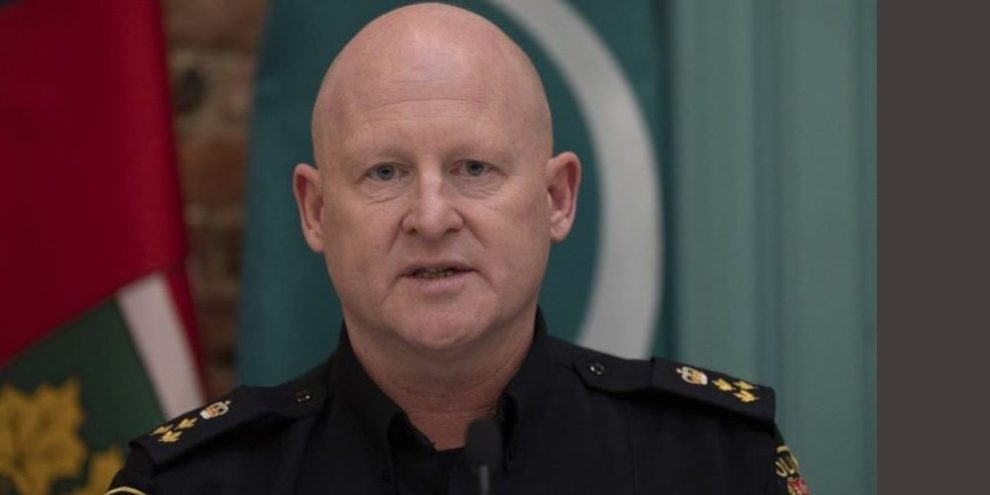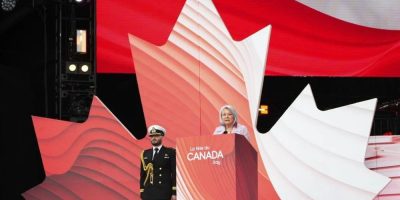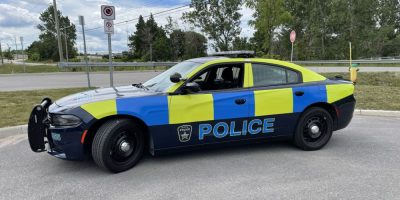
By Stephanie Taylor in Ottawa
In the days leading up to the mass protest in Ottawa last winter, police didn't have intelligence suggesting the "Freedom Convoy" would use local citizens as a "leverage point", interim police chief Steve Bell said Monday.
Bell made the comment while testifying at the Public Order Emergency Commission which is probing the federal Liberal government's use of the Emergencies Act to clear protesters.
Bell was a deputy chief and in charge of intelligence when the convoy began but was elevated to interim chief in mid-February after Peter Sloly resigned.
Commission lawyer Frank Au spent the morning questioning Bell about police intelligence ahead of the protest, including a threat assessment police prepared for the convoy's expected arrival in Ottawa on Jan. 29.
The commission heard last week that a local hotel association warned the City of Ottawa and police before protesters arrived that they were booking rooms for 30 days.
The Jan. 29 threat assessment, prepared by Ottawa police’s security intelligence section, noted an increase in social media posts suggesting violence should be used if the government does not acknowledge the convoy, but says no threats or credible plans had been identified.
“Convoy members appear to be stocking up on food and supplies which could indicate they have long-term plans to stay in Ottawa,” the report says. It also added that emotions at the demonstration may run high and traffic could be disrupted.
But Bell testified the available intelligence before protesters arrived showed the convoy would largely be a three-day event, with only a small number staying longer than one weekend.
He also told the commission that intelligence said there were a lot of people involved in the convoy but that they had been "extremely lawful," as they travelled towards Ottawa.
"They were people moving across the country determined to be heard, but they were peaceful," Bell testified. "They indicated that their intention was to be peaceful when they got here."
Bell said that's not what ultimately happened.
During his testimony, Bell repeatedly said the three-week-long protest inflicted "violence," "harm" and "trauma" onto residents in the city.
Earlier testimony from some downtown residents and local city councillors painted a picture to the commission of a lawlessness existing in the downtown during the subsequent weeks after protesters arrived.
Witnesses testified to living with an unending honking of horns and city officials spoke about how the blockade disrupted many services and closed businesses.
Bell testified Monday that nothing in the intelligence warned that protesters would end up using Ottawa residents as collateral damage. He defended the intelligence gathering and police planning at that time by saying the force was used to managing large protests, but didn't have experience working with a group like convoy organizers.
"There's nothing that indicates that the protesters are going to use the citizens of our community as the leverage point to have their voices heard."
Bell said based on intelligence police had before demonstrators first arrived, they didn't feel they had a legal right to deny them access to the city core.
A legal opinion was prepared on that for Bell ahead of the protest. It said the Charter of Rights and Freedoms and other laws had to be considered, and “where individuals or groups do not hinder or obstruct vehicular traffic for extended periods, they maintain the right to protest so far in so that it does not engage or entail unlawful conduct.”
“I believe we were unprepared for what transpired,” Bell said.
He testified that police learned lessons from their handling of the convoy protests. He pointed to their response to the "Rolling Thunder" demonstration, which protesters staged several months later, but did not lead to prolonged blockades.
During that protest, police prevented vehicles from entering downtown.
"A truck isn't a protected entity under the Charter of Rights and Freedoms," Bell said Monday. "People are."
Banner image: Ottawa Police Service Interim Chief Steve Bell speaks during a news conference, Thursday, April 28, 2022, in Ottawa. THE CANADIAN PRESS/Adrian Wyld
This report by The Canadian Press was first published Oct. 24, 2022.






